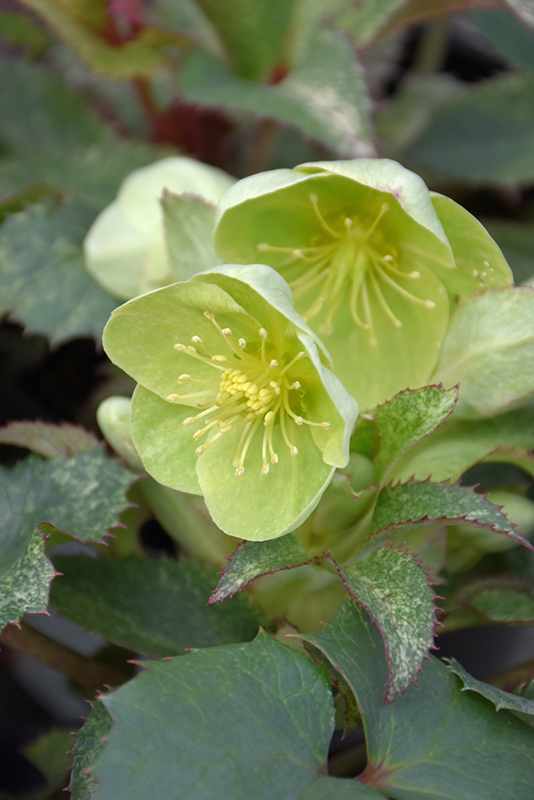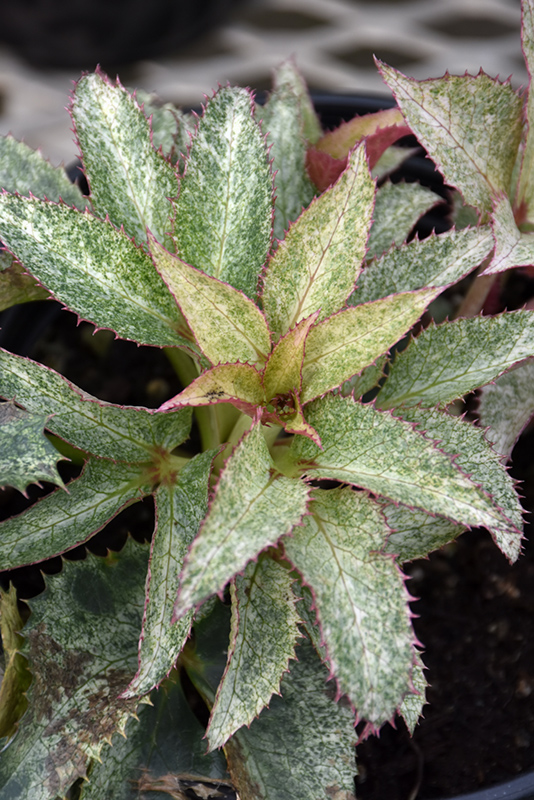>> Home
Pacific Frost Corsican Hellebore
Helleborus argutifolius 'Pacific Frost'
Height: 18 inches
Spacing: 18 inches
Sunlight:
![]()
![]()
Hardiness Zone: 6a
Other Names: Lenten Rose, Winter Rose
Description:
An extraordinary variety, producing lovely greenish-white flowers with buttery highlights in late winter; stunning variegated foliage is heavily speckled with white, appearing like frost; excellent visual contrast for the garden or border fronts
Ornamental Features
Pacific Frost Corsican Hellebore features showy nodding creamy white cup-shaped flowers with light green overtones and buttery yellow anthers at the ends of the stems from late winter to early spring. Its attractive serrated oval compound leaves emerge coral-pink in spring, turning dark green in color with showy white variegation and tinges of chartreuse the rest of the year.
Landscape Attributes
Pacific Frost Corsican Hellebore is an herbaceous evergreen perennial with an upright spreading habit of growth. Its relatively fine texture sets it apart from other garden plants with less refined foliage.
This is a relatively low maintenance plant, and should be cut back in late fall in preparation for winter. Deer don't particularly care for this plant and will usually leave it alone in favor of tastier treats. It has no significant negative characteristics.
Pacific Frost Corsican Hellebore is recommended for the following landscape applications;
- Mass Planting
- Rock/Alpine Gardens
- Border Edging
- General Garden Use
- Naturalizing And Woodland Gardens
Planting & Growing
Pacific Frost Corsican Hellebore will grow to be about 18 inches tall at maturity, with a spread of 24 inches. When grown in masses or used as a bedding plant, individual plants should be spaced approximately 18 inches apart. Its foliage tends to remain dense right to the ground, not requiring facer plants in front. It grows at a medium rate, and under ideal conditions can be expected to live for approximately 5 years. As an evegreen perennial, this plant will typically keep its form and foliage year-round.
This plant does best in partial shade to shade. It does best in average to evenly moist conditions, but will not tolerate standing water. It is not particular as to soil pH, but grows best in rich soils. It is somewhat tolerant of urban pollution, and will benefit from being planted in a relatively sheltered location. This is a selected variety of a species not originally from North America, and parts of it are known to be toxic to humans and animals, so care should be exercised in planting it around children and pets. It can be propagated by division; however, as a cultivated variety, be aware that it may be subject to certain restrictions or prohibitions on propagation.

